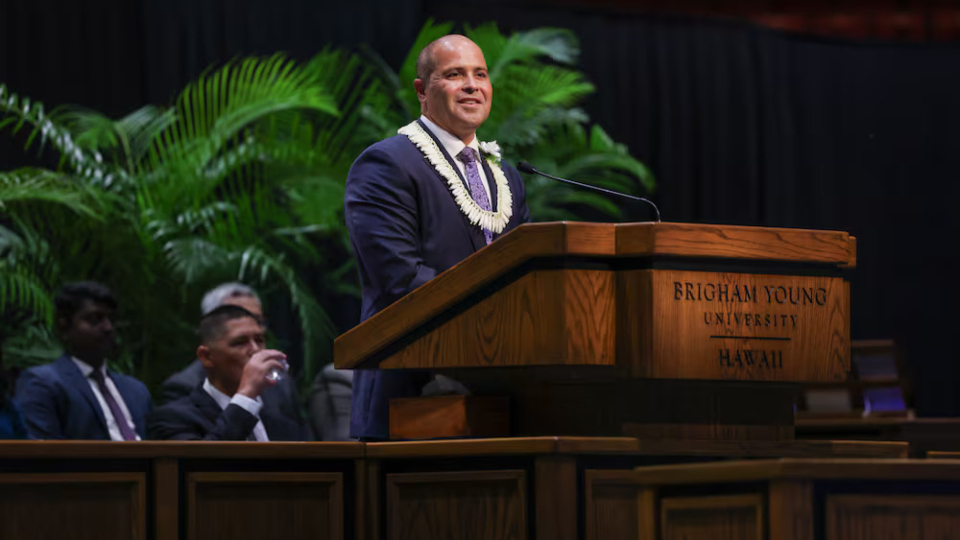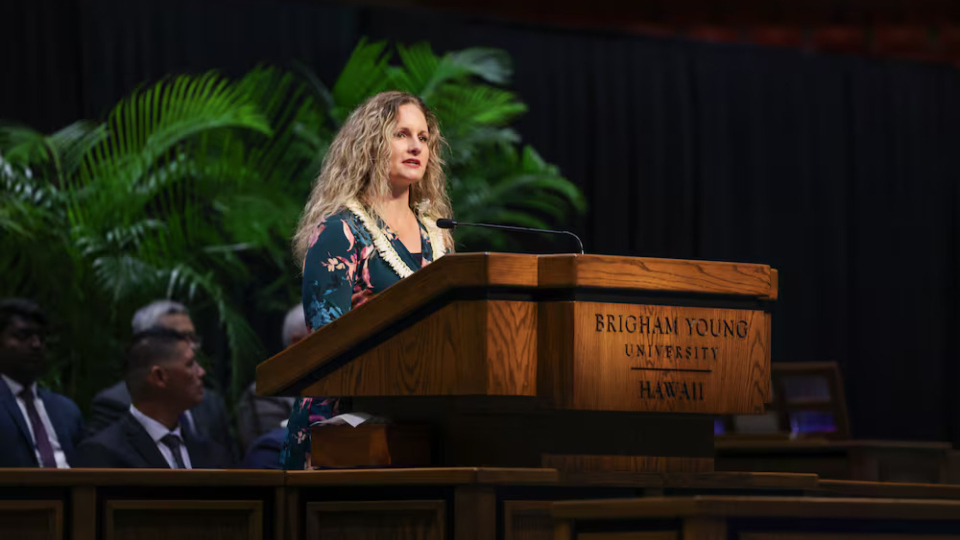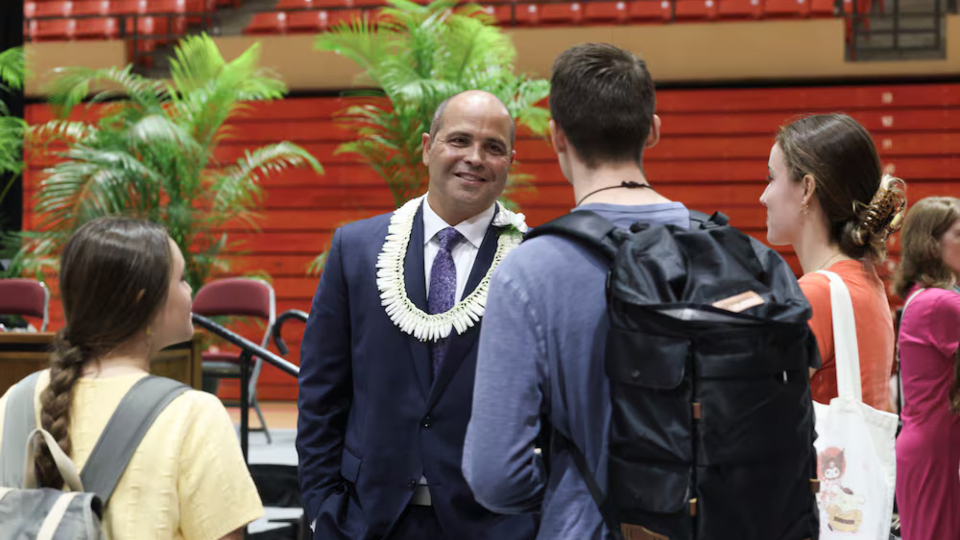
BYU-Hawaii-Consecrated-Obedience-1.jpg
Brigham Young University–Hawaii President John S.K. Kauwe III speaks at a campus devotional on Tuesday, January 14, 2025. Photo courtesy of Brigham Young University–Hawaii, courtesy of Church News.All rights reserved.This story appears here courtesy of TheChurchNews.com. It is not for use by other media.
By Kaitlyn Bancroft, Church News
Brigham Young University–Hawaii President John S.K. Kauwe III was a 16-year-old freshman at BYU in 1996 when the Honor Code Office requested he meet with them.
Unsure what they wanted to discuss, the future President Kauwe arrived at the office and was asked if he had shaved within 24 hours of taking his last exam in the testing center. He responded that he didn’t have much facial hair and so shaved only about once a week.
But the Honor Code Office staff member told him that he’d committed to being clean shaven and now wasn’t following through.
“At the time, I was annoyed, confused, maybe even a little bit offended, and I definitely thought he was taking this far too seriously,” President Kauwe recounted.
But he ultimately realized that the Honor Code Office wasn’t the problem — he was, President Kauwe said, because he wasn’t keeping his commitment. From then on, he shaved every day until he graduated. And while shaving still isn’t his favorite thing, “the blessings that have been brought into my life through the gospel and the Church Educational System are undeniable.”
President Kauwe shared this story during the university’s first devotional of the new semester on Tuesday, January 14, where he spoke to students about the power of consecrated obedience.
He was joined by his wife, Sister Monica Kauwe, who counseled students on prioritizing the many demands in their lives.
“When deciding how to spend my time, I ask, ‘Will this help me grow in faith, serve others or develop Christ-like qualities?’” she said. “Evaluating choices through this lens brings peace, and when I’m stretched too thin, focusing on Christ’s priorities — loving God and loving others — helps me know what to prioritize.”

BYU-Hawaii-Consecrated-Obedience-2.jpg
Sister Monica Kauwe, wife of Brigham Young University–Hawaii President John S.K. Kauwe III, speaks at a campus devotional on Tuesday, January 14, 2025. Photo courtesy of Brigham Young University–Hawaii, courtesy of Church News.All rights reserved.Laying Down Weapons of Rebellion
While sharing his Honor Code Office experience, President Kauwe noted that he was in “good company” in not perfectly keeping his commitments.
Prophets like Moses, Jonah and Lehi all struggled at times to resist the temptations of the natural man, he said; but each of them repented when reminded of their responsibilities and associated blessings.
Needing reminders of commitments is a natural outcome when someone challenges themselves to be better, President Kauwe said. Everyone makes mistakes, and so everyone needs repentance.
But he also cautioned students against pushing limits. He recounted the “oft-told story” of three men who applied for a job driving coaches over high, dangerous mountain roads.
The first man said he was so skilled a driver that he could skirt the road’s edge without falling off. The second man said half the wheel could hang over the edge and he wouldn’t fall. But the third man said he’d stay as far from the edge as possible.
“It is needless to ask which of the men got that job,” President Kauwe said. “Part of our progression in mortality is learning not to live our lives near the edge of the cliff.”

BYU-Hawaii-Consecrated-Obedience-3.jpg
Brigham Young University–Hawaii President John S.K. Kauwe III, center, interacts with students after a campus devotional on Tuesday, January 14, 2025. Photo courtesy of Brigham Young University–Hawaii, courtesy of Church News.All rights reserved.It can be tempting to develop one’s capacity to drive near the edge, he continued, especially when seeking the world’s approval; but that’s why, as Elder D. Todd Christofferson taught during October 2024 general conference, each person needs to “lay down the weapons of their rebellion,” like the converted Lamanites did in Alma 23:7.
In his address, Elder Christofferson pointed out that weapons of rebellion are both literal and figurative. He asked Latter-day Saints to consider how they can lay down their weapons, whatever they may be, and become so converted to the Lord that the desire for sin is taken from their hearts.
President Kauwe said that for Church Educational System students, this means living by the Honor Code they committed to.
“When we decide not to shave or to wear clothing that doesn’t meet the standards, we’re consciously deciding to use our dress and grooming as a weapon of rebellion,” he said. “These simple, daily choices are a public display, either of one’s personal integrity or one’s lack thereof.”
He continued that the Honor Code was put in place by living prophets to protect and support the sacred mission of Church Educational System schools. “You are expected to exemplify these principles and expectations, not live on the edges of them. … If this is you, the time to change is now.”
President Kauwe closed with a promise that consecration brings joy, safety and focus. “It empowers us to be, as President David O. McKay said, ‘men and women whose influence will be felt for good towards the establishment of peace internationally.’”

BYU-Hawaii-Consecrated-Obedience-4.jpg
Brigham Young University–Hawaii President John S.K. Kauwe III, center left, and his wife, Sister Monica Kauwe, center right, pose for a photo with students after a campus devotional on Tuesday, January 14, 2025. Photo courtesy of Brigham Young University–Hawaii, courtesy of Church News.All rights reserved.Copyright 2025 Deseret News Publishing Company.